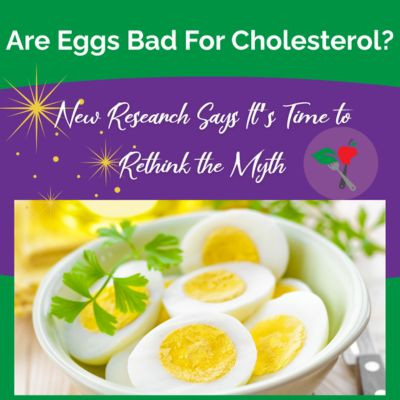Are Eggs Bad for Cholesterol? New Research Says It’s Time to Rethink the Myth
For years, eggs have lived in dietary limbo. Some hailed them as a superfood packed with protein and essential nutrients. Others warned against their high cholesterol content and potential impact on heart health. But recent research is shedding new light on this long-debated breakfast staple, and the findings may surprise you.

Cracking the Cholesterol Controversy
The concern surrounding eggs has traditionally stemmed from their cholesterol levels. One large egg contains about 186 mg of cholesterol, mostly found in the yolk. Older dietary guidelines recommend limiting cholesterol intake to under 300 mg per day. This led many to cut back on eggs out of fear they would raise LDL (low-density lipoprotein) cholesterol, also known as "bad" cholesterol.
A recent randomized, controlled trial led by researchers in Australia has challenged this long-standing assumption. The study, published in the American Journal of Clinical Nutrition, examined the separate effects of dietary cholesterol and saturated fat on LDL cholesterol levels.

The Study: Eggs vs. Saturated Fat
The trial assigned 61 adults with elevated LDL cholesterol to follow three different diets, each for five weeks:
1. High cholesterol, low saturated fat – included two eggs per day
2. Low cholesterol, high saturated fat – excluded eggs
3. High cholesterol, high saturated fat – included one egg per week
Surprisingly, the diet that included two eggs per day, but limited saturated fat, resulted in a greater reduction in LDL cholesterol than the egg-free, high-saturated fat diet. This suggests that eggs alone, despite their cholesterol content, aren’t the culprit. Instead, saturated fat intake had a much stronger correlation with increases in LDL cholesterol.
Why Eggs Aren't the Enemy

Study co-author Jon Buckley, executive dean at the University of South Australia, explained the issue isn't necessarily with cholesterol-rich foods like eggs. Rather, the saturated fat that often accompanies them in typical meals is to blame.
"The key message is that it is not foods that are high in cholesterol that increase blood levels of 'bad' cholesterol," Buckley said, "but it is the saturated fat in the foods that we consume."
Eggs are unique in that they are high in cholesterol but low in saturated fat. A large egg contains less than 2 grams of saturated fat. This makes them quite different from other animal-based foods. Foods such as fatty meats, processed cheese, and butter often contain both high cholesterol and high saturated fat.
FDA Now Deems Eggs "Healthy"
Considering this emerging research, the U.S. Food and Drug Administration (FDA) even updated its stance in December 2024. The advisory cited new evidence showing that dietary cholesterol has minimal impact on blood cholesterol for most people and recognized eggs as a healthy food.
"This important milestone closes the door on decades of debate over whether eggs are good for you,"; the FDA noted, "and reinforces their standing as a powerhouse of nutrition."
The Nutritional Value of Eggs

Eggs are nutrient-dense, affordable, and versatile, making them a smart choice for most diets. A single egg provides about 6 grams of high-quality protein, along with essential vitamins and minerals like:
• Vitamin B12 (supports nerves, eyes, bones, skin, hair)
• Vitamin D (supports bone health)
• Choline (important for brain health)
• Lutein and zeaxanthin (antioxidants that support eye health)
Eggs also contain monounsaturated fats and omega-3 fatty acids, which can be beneficial for both heart and brain health.
What About Saturated Fat?

While eggs are low in saturated fat, many popular breakfast pairings are not. Saturated fat is the more significant driver of increased LDL cholesterol and is commonly found in:
• Cheese and other full-fat dairy
• Processed meats like sausage and bacon
• Creams and butters
• Fatty cuts of beef and pork
• Baked goods like cookies, pastries, and muffins
When consumed as part of a balanced, low-saturated-fat meal, eggs are unlikely to raise cholesterol levels for most people.
Easy Tips for a Healthier Egg-Based Breakfast

To enjoy eggs without the guilt, registered dietitians recommend focusing on how you prepare them and what you eat with them. A balanced breakfast of one to two eggs with vegetables and fruit delivers a satisfying mix of protein, fiber, and healthy fats that can keep you full for hours. If you're indulging in a traditional breakfast, small changes can make a difference.
Here are a few practical tips:
1. Pair eggs with fiber-rich foods. Including, whole grain toast, fresh vegetables, or fruit.
2. Avoid frying in butter or processed oils. Instead, use olive oil or poach/boil your eggs.
3. Skip the bacon and sausage. Or replace them with avocado slices, beans, or lean turkey.
4. Limit cheese-heavy recipes. Eggs are flavorful enough without adding saturated-fat-rich toppings.
5. Watch your portions. While 1-2 eggs per day is fine for most, moderation is still key.
Eggs Deserve a Place on Your Plate

The idea that eggs are bad for your heart is no longer supported by science. New research clearly indicates that saturated fat, not dietary cholesterol, is the primary concern when it comes to managing LDL ("bad") cholesterol.
Eggs can be a valuable part of a healthy, balanced diet. Packed with protein, essential vitamins, and beneficial fats, they offer much more than their cholesterol content suggests, especially when paired with nutrient-rich foods and prepared in a health-conscious way.
That’s where Seattle Sutton's Healthy Eating comes in. Our nutritionally balanced, egg-based breakfast options are portion-controlled and ready to eat. With a variety of chef-prepared, dietitian-designed meals, we make it easy to enjoy the heart-healthy benefits of eggs without the guesswork.
We make it easy to enjoy eggs the healthy way. Our chef-prepared, dietitian-designed meals include balanced egg-based breakfasts that support heart health - without the guesswork. Every meal is portion-controlled, nutrient-rich, and ready to eat.
So next time you're planning breakfast, don't fear the egg, just be mindful of what you put around it. Or let Seattle Sutton's handle it for you, so you can enjoy great nutrition with total peace of mind.







 Weight Loss
Weight Loss Health & Wellness
Health & Wellness Diabetes
Diabetes Heart Health
Heart Health Motherhood & Family
Motherhood & Family Dietary Restriction
Dietary Restriction Other Health Conditions
Other Health Conditions About SSHE
About SSHE


